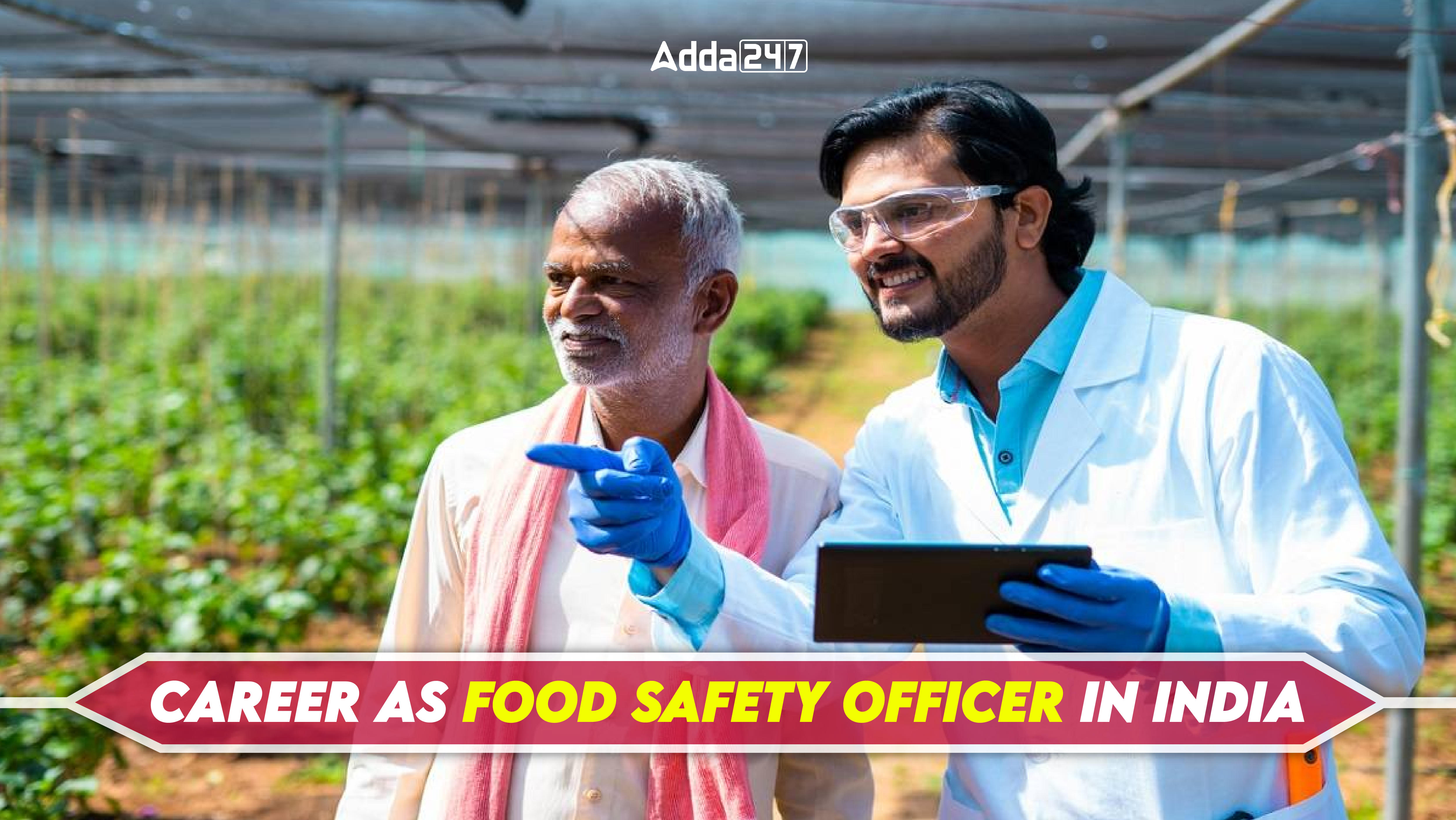Table of Contents
Looking to become a food safety officer in India? Here’s what you need to know! First off, you’ll need to meet certain qualifications, like having a bachelor’s degree in food technology, microbiology, or a related field. Then, you’ll have to pass the FSSAI exam. Once you’re certified, you’ll be responsible for ensuring food safety standards are met in various establishments. Check this detailed article which will give you all the information you need to become a Food Safety Officer in India.
Career as a Food Safety Officer
A career as a Food Safety Officer (FSO) in India is important in safeguarding public health and ensuring the integrity of the food supply chain. Food Safety Officers (FSOs) play a key role in enforcing food safety legislation, conducting establishment inspections, and monitoring adherence to protocols to avert foodborne diseases. FSOs put up endless effort to inform stakeholders, carry out inspections, and enforce regulations that protect the safety and quality of food items consumed by millions of people nationwide. They do this by combining their technical competence in food science, microbiology, and regulatory knowledge.
This professional route gives chances to make significant contributions to the public good and the improvement of food safety procedures across the country, in addition to requiring vigilance and attention to detail. In India, the primary body in charge of overseeing food safety is the Food Safety and Standards Authority of India (FSSAI), which appoints inspectors of food. The Food Safety and Standards Act of 2006 is enforced by them at the state and local levels, where they also supervise food establishments.
Food Safety Officer’s Exam In India
In India, FSOs can either be recruited through state examinations or the FSSAI Exam. Let’s check out both the aspects one by one along with their requirements.
Through State Examination
For the FSO post, candidates are chosen based on their academic records, performance on the main written test (the conventional type), preliminary written examination (multiple choice & objective type), and personal interview (personality assessment). Questions from optional courses including Botany, Veterinary Science, Statistics, Mathematics, Geology, Environmental Science, Computer Application Science, Physics, Horticulture, Forestry, Engineering, Chemistry, Agriculture, and so forth will be included in the main written test.
Passing the preliminary exam is less difficult than passing the major written exam. MCQs and an objective format would be used for the preliminary exam. The primary written examination, however, would be of the traditional kind. All eligible candidates will receive invitations to the interview after completing the preliminary and main exams.
Educational Requirements to apply to the FSO exam
A graduate degree or master’s degree is required to sit for the State exam. The State tests are open to candidates with a variety of undergraduate degrees or postgraduate specializations in Chemistry, Biotech, or Home Science.
Through FSSAI Exam
Applicants must pass the Food Safety Officer (FSO) exam to be eligible to work as food inspectors in India. The Food Safety and Standards Authority of India (FSSAI), the main regulatory organization in charge of guaranteeing food safety throughout the nation, administers this exam, which functions as the major qualification procedure.
The purpose of the FSO exam is to evaluate a candidate’s knowledge and proficiency in a range of areas related to food safety, such as food science, food laws and regulations, hygiene standards, and public health concepts.
FSSAI Food Saftey Officer Exam Pattern
1. Complete Higher Secondary Education
- Education Requirement: Start by completing your higher secondary education (12th grade) from a recognized board.
- Subject Requirements: Focus on subjects such as Physics, Chemistry, and Mathematics, as these are often required for entrance into science-related undergraduate programs.
- Minimum Marks: Aim for a minimum of 50% aggregate marks, though specific requirements may vary by institution.
2. Prepare for and Clear Entrance Examinations (Optional)
- Entrance Exams: Depending on the college or university you plan to attend, you may need to prepare and clear entrance examinations such as:
-
- Joint Entrance Examination (JEE)
- Indian Institute of Science Education and Research – Entrance Examination (IISER-EE)
- Indian Council of Agricultural Research All India Entrance Examination for Admission (ICAR AIEEA)
- Birla Institute of Technology and Science Admission Test (BITSAT)
- Purpose: These exams determine admission into undergraduate science or technology programs.
3. Obtain a Bachelor’s Degree
- Degree Requirement: Earn a Bachelor’s degree in a relevant field such as:
-
- BSc (Bachelor of Science) in Agriculture, Agronomy, Food Science, Plant Science, or Dairy Science
- BTech (Bachelor of Technology) in Agriculture Engineering, Dairy Technology, Food Technology, or Biotechnology
- Core Subject: Chemistry is often a core subject requirement due to its relevance in food inspection.
4. Pass the Food Inspector Exam
- Exam Requirement: After completing your bachelor’s degree, you’ll need to pass the Food Inspector exam.
- Exam Conducted By: In India, the Food Inspector exam is typically conducted by the FSSAI or State Civil Examinations for government positions.
- Preparation: Study extensively on food inspection practices, food safety laws, and related topics to clear the written exam.
5. Clear the Interview
- Interview Round: Upon passing the written exam, candidates must attend an interview.
- Assessment: The interview assesses your knowledge, confidence, and attitude towards food inspection responsibilities.
- Preparation: Prepare by reviewing commonly asked questions and understanding current food safety issues.
6. Consider Getting a Master’s Degree (Optional)
- Further Education: While not mandatory, pursuing a Master’s degree can enhance your career prospects and eligibility for higher positions.
- Recommended Degrees: Consider programs like:
- MSc (Master of Science) in Agriculture, Horticulture, Chemistry, Soil Science, Plant Science, Food Science, Life Science, or Dairy Science
- MTech (Master of Technology) in Agriculture Engineering, Biotechnology, Food Technology, or Dairy Technology
7. Gain Work Experience
- Career Progression: Start gaining practical experience as a food inspector.
- Job Roles: Initially, you may work in entry-level positions, conducting inspections and ensuring food safety compliance.
- Advancement: With experience, you can progress to managerial or director-level positions, where responsibilities include oversight of food safety programs and policies.
Following these steps diligently will prepare you for a rewarding career as a food inspector, ensuring public health and safety through rigorous inspection and compliance monitoring.
Food Safety Officer’s Role
Look at the table summarizing the various job roles that Food Safety Officers (FSOs) can be recruited for, along with their responsibilities:
| Job Role | Responsibilities |
|---|---|
| Food & Drug Administrator |
|
| Food Technologist |
|
| Food Scientist |
|
| Health Inspector |
|
Food Safety Officer’s Salary
| Job Role | Initial Level Salary (INR) | Mid Level Salary (INR) | Highest Salary (INR) |
|---|---|---|---|
| Food & Drug Administrator | 3 Lakhs | 4 Lakhs | 5 Lakhs |
| Food Technologist | 3 Lakhs | 4.5 Lakhs | 7 Lakhs |
| Food Scientist | 4 Lakhs | 7.5 Lakhs | 20 Lakhs |
| Health Inspector | 2.4 Lakhs | 3 Lakhs | 6 Lakhs |




 RPSC Agriculture Officer Admit Card 2025...
RPSC Agriculture Officer Admit Card 2025...
 ASRB NET Syllabus 2025, Check Detailed S...
ASRB NET Syllabus 2025, Check Detailed S...
 BSSC Field Assistant Recruitment 2025 No...
BSSC Field Assistant Recruitment 2025 No...


 Adda247 Job portal has complete information about all Sarkari Jobs and Naukri Alerts, its latest recruitment notifications, from all state and national level jobs and their updates.
Adda247 Job portal has complete information about all Sarkari Jobs and Naukri Alerts, its latest recruitment notifications, from all state and national level jobs and their updates.